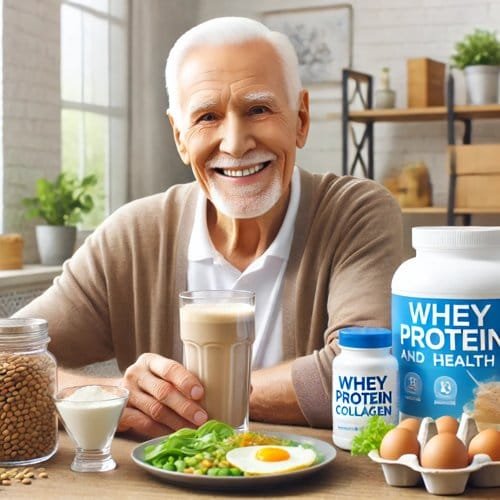Protein and Bone Health | How Protein Supports Stronger Bones

Protein is a key building block of bones, making up about 50% of bone volume. It works alongside calcium, vitamin D, and other nutrients to maintain bone strength and prevent osteoporosis.
According to the National Osteoporosis Foundation, protein intake is essential for bone mineral density and reducing fracture risk in aging adults.
Why Protein is Essential for Bone Health
🦴 Supports Bone Formation & Density
- Protein is necessary for collagen production, the main structural component of bones.
- Helps increase bone mineral density (BMD) and reduces bone loss.
💪 Prevents Osteoporosis & Fractures
- Studies show that higher protein intake leads to better bone strength and fewer fractures.
- Essential for bone remodeling and repair.
🛡 Improves Calcium Absorption
- Protein helps the body use calcium effectively, preventing bone mineral loss.
- Works best when combined with calcium and vitamin D.
❤️ Supports Muscle Strength & Balance
- Strong muscles help prevent falls and fractures.
- Older adults with higher protein intake have better mobility and balance.
Best Protein Sources for Bone Health
🌱 Plant-Based Proteins
- Legumes (Lentils, Chickpeas, Black Beans)
- Nuts & Seeds (Almonds, Chia Seeds, Flaxseeds)
- Soy-Based Products (Tofu, Tempeh, Edamame)
- Whole Grains (Quinoa, Brown Rice, Oats)
- Vegetables (Spinach, Broccoli, Peas)
🍗 Animal-Based Proteins
- Lean Meats (Chicken, Turkey, Grass-Fed Beef)
- Fish & Seafood (Salmon, Tuna, Sardines)
- Dairy Products (Greek Yogurt, Cottage Cheese, Milk)
- Eggs (High in protein and essential amino acids)
- Bone Broth (Rich in collagen for bone support)
Best Protein Supplements for Bone Strength
Not all protein supplements are equally beneficial for bones. Here are the best types:
1️⃣ Whey Protein (Fast-Absorbing, Rich in Amino Acids)
- Best for muscle and bone support.
- Contains high levels of leucine, essential for bone maintenance.
2️⃣ Collagen Protein (Best for Bone Flexibility & Joint Health)
- Helps in collagen formation and reduces bone loss.
- Works well when combined with vitamin C.
3️⃣ Plant-Based Protein (For Vegetarians & Vegans)
- Made from pea, hemp, rice, or soy protein.
- Supports bone density and overall health.
4️⃣ Bone Broth Protein (Rich in Collagen & Minerals)
- Provides gelatin, calcium, and magnesium for bones.
- Supports joint and connective tissue health.
Recommended Protein Intake for Bone Health
| Age & Gender | Recommended Daily Intake |
|---|---|
| Adult Women (50+) | 46-60g/day |
| Adult Men (50+) | 56-70g/day |
| Seniors with Osteoporosis | 1.0-1.2g/kg of body weight |
| Athletes & Active Seniors | Up to 1.5g/kg of body weight |
💡 Tip: Spread protein intake evenly throughout the day for better absorption.
Best Protein Combinations for Bone Strength
1️⃣ Protein + Calcium + Vitamin D3 ☀️
- Maximizes bone-building potential.
2️⃣ Protein + Collagen + Vitamin C 🔗
- Improves bone flexibility and reduces fractures.
3️⃣ Protein + Magnesium + Boron 💪
- Enhances bone mineralization and muscle strength.
4️⃣ Protein + Omega-3s 🦴
- Reduces inflammation and supports bone structure.
Questions & Answers
1. How does protein help with bone health?
Protein is essential for collagen production, bone remodeling, and maintaining bone mineral density.
2. Can too much protein weaken bones?
No, recent studies show that high protein intake benefits bone health, especially when combined with calcium and vitamin D.
3. What are the best protein sources for bone strength?
Lean meats, dairy, fish, legumes, nuts, and soy-based foods are excellent sources.
4. Does collagen protein help bones?
Yes! Collagen makes up 30% of bone mass and improves bone flexibility and strength.
5. How much protein should seniors eat for strong bones?
Seniors need 1.0-1.2g/kg of body weight daily to prevent bone loss.
6. Can plant-based proteins support bone health?
Yes! Soy, legumes, and quinoa provide all essential amino acids needed for bones.
7. Should I take protein supplements for bone health?
If you struggle to meet daily protein needs, whey, collagen, or plant-based protein can help.
8. Is protein more important than calcium for bones?
Both are essential, but protein improves calcium absorption and supports bone structure.
9. When is the best time to take protein for bone health?
Spread protein intake throughout the day for maximum benefit.
10. Does protein help prevent osteoporosis?
Yes! Protein reduces fracture risk and supports bone mineral density, especially in aging adults.
Conclusion
Protein is essential for bone health, improving bone density, reducing fracture risk, and supporting overall strength. Ensuring a balanced protein intake from diet or supplements can help maintain strong and healthy bones.
💡 Next Steps:
🔗 Learn More About Collagen & Bone Strength
🔗 Explore the Best Calcium Supplements
🛒 Looking for the Best Protein Supplements for Bone Health? Click here to see our top recommendations! 🚀